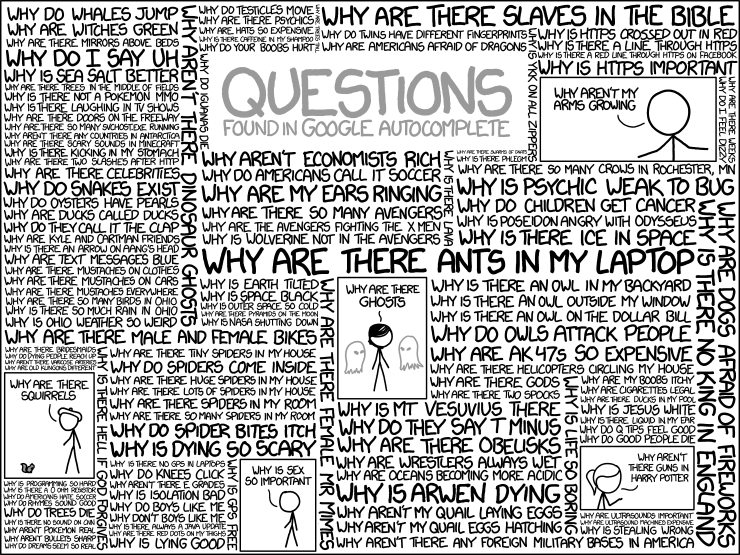I invite you to ask anything you’re wondering about that’s remotely related to effective altruism. There’s no such thing as a question too basic.
Try to ask your first batch of questions by Monday, October 17 (so that people who want to answer questions can know to make some time around then).
Everyone is encouraged to answer (see more on this below). There’s a small prize for questions and answers. [Edit: prize-winning questions and answers are announced here.]
This is a test thread — we might try variations on it later.[1]
How to ask questions
Ask anything you’re wondering about that has anything to do with effective altruism.
More guidelines:
- Try to post each question as a separate "Answer"-style comment on the post.
- There’s no such thing as a question too basic (or too niche!).
- Follow the Forum norms.[2]
I encourage everyone to view asking questions that you think might be “too basic” as a public service; if you’re wondering about something, others might, too.
Example questions
- I’m confused about Bayesianism; does anyone have a good explainer?
- Is everyone in EA a utilitarian?
- Why would we care about neglectedness?
- Why do people work on farmed animal welfare specifically vs just working on animal welfare?
- Is EA an organization?
- How do people justify working on things that will happen in the future when there’s suffering happening today?
- Why do people think that forecasting or prediction markets work? (Or, do they?)
How to answer questions
Anyone can answer questions, and there can (and should) be multiple answers to many of the questions. I encourage you to point people to relevant resources — you don’t have to write everything from scratch!
Norms and guides:
- Be generous and welcoming (no patronizing).
- Honestly share your uncertainty about your answer.
- Feel free to give partial answers or point people to relevant resources if you can’t or don’t have time to give a full answer.
- Don’t represent your answer as an official answer on behalf of effective altruism.
- Keep to the Forum norms.
You should feel free and welcome to vote on the answers (upvote the ones you like!). You can also give answers to questions that already have an answer, or reply to existing answers, especially if you disagree.
The (small) prize
This isn’t a competition, but just to help kick-start this thing (and to celebrate excellent discussion at the end), the Forum team will award $100 each to my 5 favorite questions, and $100 each to my 5 favorite answers (questions posted before Monday, October 17, answers posted before October 24).
I’ll post a comment on this post with the results, and edit the post itself to list the winners. [Edit: prize-winning questions and answers are announced here.]

- ^
Your feedback is very welcome! We’re considering trying out themed versions in the future; e.g. “Ask anything about cause prioritization” or “Ask anything about AI safety.”
We’re hoping this thread will help get clarity and good answers, counter some impostor syndrome that exists in the community (see 1 and 2), potentially rediscover some good resources, and generally make us collectively more willing to ask about things that confuse us.
- ^
If I think something is rude or otherwise norm-breaking, I’ll delete it.

Does being principled produce the same choice outcomes as being a long-term-consequentialist ?
Leadership circles[1] emphasize putting principles first. Utilitarianism rejects this approach: it focuses on maximizing outcomes, with little normative attention paid to the process (or, as the quip goes: the ends justify the means). This (apparent) distinction pits EA against conventional wisdom and, speaking from my experience as a group organizer,[2] is a turn-off.
However, this dichotomy seems false to me. I can easily imagine a conflict between a myopic utilitarian and a deontologist (e.g. the first might rig the lottery to send more money to charity).[3] I have more trouble imagining a conflict between a provident utilitarian and a principles-first person (e.g. cheating may help in the short term, but in the long-term, I may be barred from playing the game).[4]
Even if principles sometimes butt heads (e.g. being kind vs. being honest), so can different choice outcomes (e.g. minimizing animal suffering vs. maximizing human flourishing). Both these differences are resolved by changing the question's parameters or definitions:[5] being dishonest is an unkindness; we need to take both sufferings into account.
All in all, it seems like both approaches face the same internal problems, the same resolutions, and could produce the same answer set. If this turns out to be true, there are a few possible consequences:
I'm thinking of Stephen Covey's works "7 Habits of Highly Effective People" (1989) and "Principle-Centered Leadership" (1992). If these leadership models are outdated, please correct me.
When tabling for a new EA group, mentioning utilitarianism cast a shadow on a few (~40%) conversations. When I explained how we choose between lives we save every day, people seemed more empathetic, but it felt like a harder sell than it had to be.
I would love for someone to do proper math to see if this expected value works out. Quick maths are as follows (making assumptions along the way). Assume the lottery is 100M$ with a 80% chance of getting caught, and otherwise, you make 200G per year, and you'd get 10 years in prison for rigging. EV of lottery rigging = winning profits + losing costs = .2*$100M + .8*(-$200G/yr*10 yr) = 18.4M.
I'm assuming that we live in a society that doesn't value cheating...
This strategy is Captain Kirk's when solving the Kobayashi Maru.
Its modus tollens comes to the same conclusion as utilitarianism: if you have the wrong consequences, you must have had the wrong processes.
The most important principle is to maximize long-run utility. All else follows.